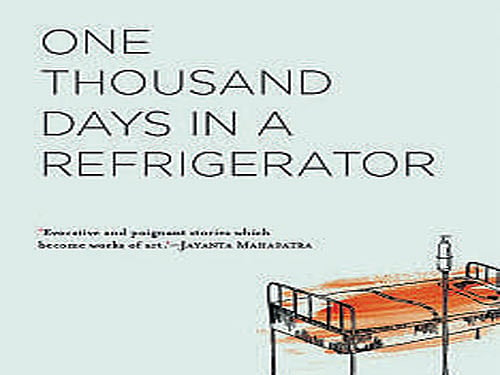
One Thousand Days In A Refrigerator
Manoj Kumar Panda, translated by
Snehaprava Das
Speaking Tiger
2016, pp 224, Rs 299
A good short story would take me out of myself and then stuff me back in, outsized now and uneasy with the fit,” says David Sedaris.
This manoeuvring is done with expertise by Manoj Kumar Panda in his collection of short stories titled One Thousand Days In A Refrigerator.
In the title story, Lara has withdrawn from the world. Her body is hanging on to a life-support machine. Her narrator-husband is overcome with grief but also relief, for Lara is finally his and his alone. Strands of past events are recalled, wounds are probed. And the naive reader parts from his naivety as he learns about how Lara’s husband is her “most intimate, closest enemy.” Events conspire to make Lara retreat into a “bleak, suffocating world of loneliness and detachment,” and fill her husband with a gnawing sense of impotence. It is the last cruel, kind act that will bring absolution.
Rajula Dip of When the Gods Left is the lowest of the low, disposing carcasses of man and animal. His body, like the cart he uses, is falling apart. Despised by people, he has an intimate and loving relationship with the inanimate objects around him.
The story unfolds the hypocrisy of the high-caste family who worship their cow when alive, but find it unclean and want it gone once it has stopped breathing. It’s a story of marginalisation, but instead of dreariness and sorrow there is an unexpected happiness. When Rajula laughs, it is “as if he had stolen the laughter from everyone else’s lips and hoarded them in his own.” Neither ostracisation nor poverty can touch his spirit.
Kanishka is a tender story of an autistic child and his pubescent babysitter who lavishes all her newly mined love on him. Her make-believe world is full of rapture. Her little ward is both her baby and her bridegroom.
Filling in the Blanks deals with Dhania, a young girl in an arid, unfeeling world, pawned off as a bonded labour for a few rupees and some rice. She flees to escape the pawing hands of her employer, and is pursued hotly by a muscular fellow, whose thundering footsteps leave a trail of dead butterflies. The inner tussle of her grandfather as he weighs Dhania’s return against the loan, is agonisingly precise.
The Testimony of God tells of the helplessness of god himself in the face of cunning, conniving man. God comes down to provide testimony to free an innocent woman from the charges of murdering her son, and fails miserably.
In Aesthetics of a Super Cyclone, Ruben, a survivor of a cyclone, finds himself bleached of all emotion. His little safe world has been whirled away. Now, all emotion is futile. He stands alongside god. He fears nothing, feels nothing.
Manoj Kumar Panda daringly rushes in where others would fear to tread. With bold strokes he paints his world and challenges one to enter it. In a story of a marriage gone sour, and full of recriminations, the couple wishing to divorce is Sentenced To A Honeymoon by the judge. A woman has been raped. In a curious twist, she searches out the family of the rapist and pieces together their story in Fragments.
In The Hunt, apparently a hunt is on for a tiger that mauled Hiran Majhi’s son, but in truth, the hunt is of Hiran Majhi and his hapless family. The malicious, power-wielding priest’s hold on the village is mesmerising.
Reading this collection, one is reminded of a familiar emotion when the ‘Globe of Death’ was rolled into the circus arena. A heart clutched in delightful panic.
Manoj Kumar Panda dons his helmet, revs up his vehicle, plummets, and soars — defying god, death, poverty, superstition — leaving us writhing in tormenting wonder, half wishing it to be over and half not. A word of praise for the masterly translation.
